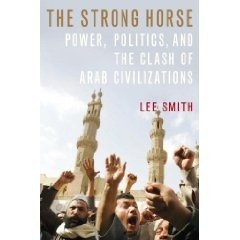Lee Smith's book on Arab culture

Much fun has been made in recent years of Weekly Standard Middle East correspondent (whose work has appeared in Slate, The Nation and elsewhere) Lee Smith's tagline that he is "writing a book on Arab culture." Well, that book is now out. I've read it, and it's horrible. I did not expect much from Lee Smith, whose articles repeated neocon bromides about the region and always put partisanship above analysis. But I had never expected a book so appallingly racist, disjointed, full of factual error and borderline psychotic.
Max Rodenbeck reviewed "The Strong Horse" for The National, his sentiments are mine:
For Lee Smith, none of this really counts. The Arabs, in his view, simply have the misfortune to be guided by something he identifies as the “strong horse principle”: an apparently unique, ancient system whereby one tribe, nation, or civilisation dominates the others by force, until it too is overthrown by force. The “strong horse”, he says, represents the fundamental character of the Arabic-speaking Middle East. This is a perennially violent, xenophobic place where, in his words: “Bin Ladenism is not drawn from the extremist fringe, but represents the social norm.”
[. . .]
Smith explains elsewhere that although Arabs constantly bicker, “Perhaps the more serious concern is that the Arabs will not fight each other, and choose instead to bind together… in order to focus their energies elsewhere, like against the United States, again.” That last word is what really gives pause. To what past event exactly is Smith referring? Might he mean that dark day when the joint Arab high command sent veiled storm troopers on black helicopters into Wyoming? Or is he just subtly reasserting his sweeping charge that the Arabs as a whole were responsible for September 11 – and hinting that they might do the same again unless America spanks them regularly?
This disregard for reality appears to be prompted by two things. One is an attitude towards Arabs that may be delicately described as anachronistic and patronising. How else can one explain lapses into what sound like 19th-century depictions of barbarians? In one departure from constant praise of Bush-administration policy, for instance, Smith sneers at its naivety in thinking democracy might have flourished here when this great American gift was presented, “like an iPhone left out for the Arabs to figure out on their own.”
Elsewhere Smith informs us sagely that Arab women “hold men in contempt if they are not willing to kill and die for Arab honour.” Arabs, we discover, regard any man who says he wants peace with his neighbour, “not a peace that comes through destruction and elimination, but a real peace,” as a traitor. No wonder, for this is a people so tribally ferocious, he insists, that they hate Americans, “Not because of what we do or who we are but because of what we are not: Arabs.”
I would only add that it's a great shame that a reputable publisher, Doubleday, put out this book. I don't think that would have been the case if its subject matter hadn't been Arabs.
